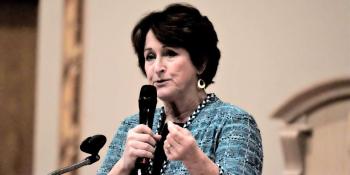By Katya Fitzpatrick
Mary Rice Hasson is an attorney, policy expert, and Kate O’Beirne Senior Fellow at the Ethics and Public Policy Center in Washington, D.C. She co-founded and directs the Person and Identity Project, which works to “equip people of faith with the knowledge and resources they need to promote a really authentic vision of the person and to counter gender ideology.” Her writings have appeared in the Wall Street Journal and Newsweek, among others. Hasson has been a three-time keynote speaker for the Holy See at the United Nations Commission on the Status of Women and serves as a consultant to the U.S. Conference of Catholic Bishops’ Committee on Laity, Marriage, Family, Life, and Youth.
Hasson is coming to Notre Dame of Bethlehem Church, Bethlehem, on Oct. 8, 2-6pm, for a diocesan-wide workshop, “Gender Ideology: What Catholics Need to Know.”
KF: What is gender ideology and how is it affecting our culture?
MRH: The basic concept of gender ideology is, I get to decide who I am. There is no God. There’s nothing restraining me. It’s my desires and feelings. It’s not an ideology just in terms of politics. It’s a belief system that operates very much on a cultural level as well as a political level. For people who are activists, who have adopted the beliefs of gender ideology, they really believe that the family, religion, traditional morality—all of these are oppressive to the human person. They believe the natural limitations of the human body are oppressive to the human person. The human person as understood by gender activists is “truly free” when they get to do what they want. They get to define reality according to their terms.
KF: When did we start seeing gender ideology ideas in the culture?
MRH: Gender ideology has philosophical roots that extend back to nihilism, elements of Marxism, and radical individualism. In the 1960’s, it was during the sexual revolution, with contraception, where sex was being divided from reproduction. In the general understanding of people, that was the first wedge in getting the ideology into the culture. Since then, there’s been a concerted effort of people who are true believers. People who are proponents of this belief system who have been working for decades to transform society to reflect a different vision of the person.
KF: How does gender ideology contradict Christian beliefs about the human person?
MRH: Christianity and most theistic religions believe in God as Creator. In other words, we don’t design ourselves. We’re made by a loving God. We’re made for a purpose. There’s a design to our body. We have a human nature. We can look to the scriptures, “male and female He created them.” And we see that borne out in science. It’s not just a religious position.
KF: Why has there been an explosion of young people adopting tenets of gender ideology?
MRH: It has been promoted by media, social media, corporations, corporate advertising, and now, increasingly, by schools and healthcare. Once you have these major institutional players in the culture embracing this alternate belief system about the person and doing everything they can, not just to introduce these ideas to children, but to form them in these ideas, then you start to see uptake.
KF: Why are teens and pre-teens at a higher risk of being lured by gender ideology ideas?
MRH: It’s not uncommon for young people, as they approach puberty, to feel uncomfortable with their bodies. That’s kind of a normal thing. It’s magnified when a child has experienced trauma in their childhood or on the cusp of puberty. You see that in the backgrounds of many of the young people who identify as transgender. There’s a very high rate of preexisting mental health issues—whether it’s depression, anxiety, autism diagnosis—among those who have been diagnosed with gender dysphoria compared to the average population.
KF: How should we respond to someone wrestling with beliefs formed by gender ideology?
MRH: Love them. Tell them you love them. Ask questions. Listen to what they want to say. But then you have to have the courage to speak the truth. Empathize with their feelings but speak the truth. It’s a good thing to be created male or female. That’s who you are, and you can’t change sex. Whatever is causing this distress about your body, your identity, we’ll help you. But there are some things we can’t do. We’re not going to facilitate you going on a path that leads towards harm. We’re not going to give permission for self-harm, like if you engage in binding or taking hormones or things that are going to damage you.
KF: What’s the message behind the “Gender Ideology: What Catholics Need to Know” workshop?
MRH: It’s a message of hope. God loves everyone. God has a plan for everyone. We want to be open and responsive to that. So even if you think you’re coming from a different perspective, you think you know what the Church teaches, and you think you disagree. I would say come and learn and hear what the Church has to say. Pray about it and think about it. Our God is a God of love, and He wants what’s good for everyone.
To learn more and register for the diocesan-wide workshop, “Gender Ideology: What Catholics Need to Know,” visit https://www.allentowndiocese.org/gender-ideology.
Photo: Mary Rice Hasson, the co-founder of the Person and Identity Project, gives a presentation on gender ideology during an in-service program, Feb. 17, 2023, at the Catholic Pastoral Center in Nashville, Tenn. (OSV News photo/Andy Telli, Tennessee Register. Used with permission.)








